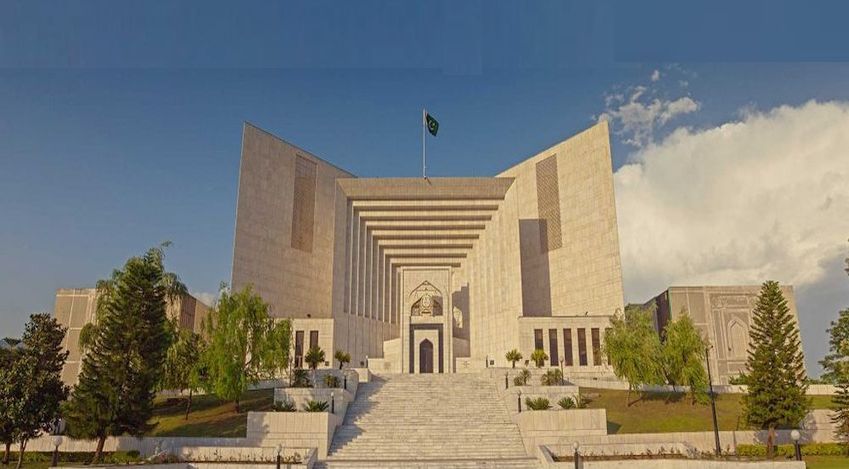The Special Tribunals may be constituted for the Redressal of Grievances of Employees with Non-Statutory Service Rules --- SCP
Islamabad 15-06-2024: The latest judgment of Supreme Court of Pakistan decided three Civil Appeals challenging decisions by the Lahore High Court related to the Punjab Provincial Cooperative Bank, Ltd. (the Bank). The [Civil Appeal No.795-L of 2012 along with connected cases] are decided by The Full Bench of Honourable Supreme Court of Pakistan comprising of Mr. Justice Muhammad Ali Mazhar, Mrs. Justice Ayesha A. Malik and Mr. Justice Irfan Saadat Khan observed that the core issue revolves around whether employees of the Bank, in the absence of statutory service rules, can seek redress from the High Court under Article 199 of the Constitution of Pakistan.
The 2010 Staff Service Rules of the Punjab Cooperative Bank Limited, framed under the bank's bye-laws, govern the employees' terms and conditions, indicating a master-servant relationship without statutory backing. The jurisdiction refers to the legal authority given to Courts to adjudicate matters. Errors must be corrected to uphold judicial conscience. The jurisdiction cannot be conferred by consent; therefore without Statutory Service Rules, employees cannot invoke the High Court's writ jurisdiction. The previous rulings reaffirm this stance, establishing that grievances must be addressed through Civil Suits, not Writ Petitions.
It is further observed that Supreme Court decisions on legal questions or principles are binding on all Pakistani courts. Even obiter dicta, or incidental remarks, are highly respected if they express the Court's View on legal principles. The doctrine of ‘Stare Decisis’ emphasizes maintaining consistency in legal decisions to ensure predictability and stability in the law. Despite non-maintainability of writ petitions, the High Court directed the bank to expedite pending employee appeals as per Rule 40 of the Staff Service Rules, 2010, highlighting the necessity of adhering to internal service rules. The doctrine of Indoor Management obliges the bank's management to follow its own service rules. The bank must decide appeals within a reasonable time, and any failure makes the rules unserviceable. It is observed that despite the settled law, employees often file writ petitions against adverse actions, wasting court time. The only remedy in such cases is a Civil Suit due to the Master-Servant Relationship.
Previously the Section 2A of the Federal Service Tribunal Act, 1973, allowed employees of Federal Corporations to be treated as Civil Servants, enabling them to seek redress from the Service Tribunal, reflecting judicial consensus against arbitrary employer actions. The Section 2A of the STA was declared partially unconstitutional. Employees not defined as Civil Servants under the Civil Servants Act, 1973, cannot seek remedies from the Service Tribunal, leaving Civil Suits as the appropriate recourse.
The Master and Servant laws historically favored employers, with harsh penalties for employees. Modern laws, like the UK's Employment Rights Act, demand fair treatment of employees, recognizing fundamental rights. The Supreme Court of Pakistan recommended that there's a need for legal reforms to ensure that even non-statutory service rules respect fundamental rights, as mandated by the Constitution, ensuring fair treatment and justice for employees.
On account of no expeditious remedy or forum to challenge the adverse actions, such employees have to file civil suits and wait for a number of years for their decision, but if they are allowed a fast-track remedy under some legislation ensuring that some lawful justification for termination of contracts of employment is provided, and if such legislation also creates some rights and obligations for employers and employees with the formation of special courts or tribunals, then their cases will also be decided on a speedy pace, just as the cases of civil servants and workman/workers are decided by the Service Tribunal, NIRC, and labour courts within lesser time than the time normally consumed in civil courts. If any such tribunal or special court is constituted under some special law, it will not only ensure checks and balances but ardently and fervently ease and alleviate the sufferings of the aforesaid category of employees who presently have to go through the miseries and turmoil of the rigors and rigidities of procedure, and the backlog of cases, for a long time.
The previous decision of Supreme Court in Ikram Bari emphasizes the state's obligation to provide social and economic justice, making the Objectives Resolution part of the Constitution to support an exploitation-free society.
Powered by Froala Editor








